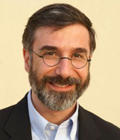
|
You get a simple answer when you ask Dr. Samir N. Khleif about what areas of the Georgia Health Sciences University cancer program have the most potential.“Everything.” From Dr. Khleif’s standpoint, the major investments the university and its health system have made in cancer in recent years make it “fertile ground” to produce the next big advancement in cancer research and clinical care. The Georgia Health Sciences Cancer Center, which is working toward an NCI cancer center status, includes GHSU’s five-story, 167,000-square-foot research building, which opened in 2006, and its health system’s Cancer Center, which opened in 2010 to provide state-of-the-art treatment, including emerging therapies that have proven safe and effective enough in laboratory studies to test on patients. Khleif said he is excited about the prospect of creating synergies and increasing collaboration between the core cancer group, which primarily consists of Medical College of Georgia faculty, and other components of the Georgia Health Sciences enterprise, such as the GHSU College of Dental Medicine. “That is just one example,” he said. “There is a lot of expertise throughout the institution. There are people who are national experts in their fields.” Khleif, who joined the National Cancer Institute in 1990, is also a medical oncology consultant with the National Naval Medical Center and a Professor of Medicine at the Uniformed Services University of the Health Sciences. He studies ways to enlist the immune system’s cooperation with cancer treatment, both by bolstering its ability to attack cancer cells and inhibiting its faulty interference with cancer treatment. During his tenure at the National Cancer Institute, Dr. Khleif served as the Director General and Chief Executive Officer of the King Hussein Cancer Center and then of the King Hussein Institute for Biotechnology and Cancer, appointed by the Secretary of the Department of Health and Human Services through an agreement between the United States and the Kingdom of Jordan. He has also served as a Special Assistant to the FDA Commissioner, leading oncology efforts to make drug discovery and development more efficient, innovative and cost-effective. Khleif earned his medical degree from the University of Jordan. He completed a residency in internal medicine from the Medical College of Ohio and a fellowship in medical oncology from the National Cancer Institute. He is a Diplomate of the American Board of Internal Medicine and the author of numerous peer-reviewed papers and two books on cancer vaccines and medical oncology. Khleif is a recipient of the National Institutes of Health Award for Merit, the NCI Directors’ Gold Star Award, and a Lifetime Achievement Award from the Jordan Medical Association/General Union of Physicians. Samir N. Khleif, MD, Director, Georgia Health Sciences University Cancer Center from TEAM DRAFT on Vimeo. |
Awareness • Early Detection • Treatment • Research • Survivorship
